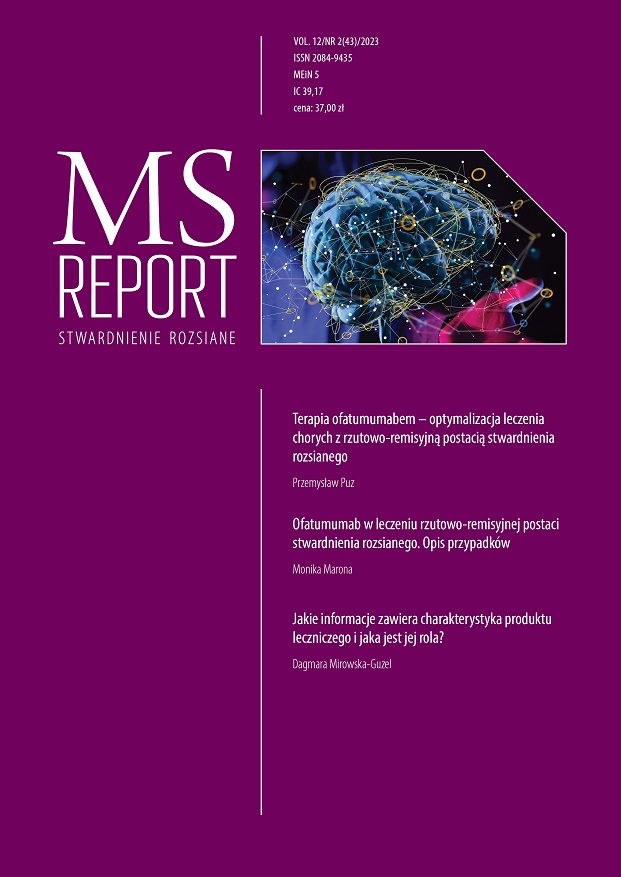Ofatumumab therapy – treatment optimization in patients with relapsing- -remitting multiple sclerosis Case report
Main Article Content
Abstract
Optimization of therapy in patients with relapsing-remitting multiple sclerosis previously treated with immunomodulators requires an individual approach for each patient. Ofatumumab is a drug used in the treatment of patients with relapsing-remitting multiple sclerosis, classified as a highly effective therapy and at the same time a drug with a favorable safety profile. This article presents two patients who required a change in immunomodulatory therapy. In the first patient, partial ineffectiveness of the initial immunomodulatory therapy was observed during treatment. Ofatumumab was used in the patient as a highly effective therapy available in the first-line treatment of multiple sclerosis under the drug program of the Ministry of Health. In the second patient, ofatumumab was used as escalation therapy due to the occurrence of disease activity and side effects during the use of previous immunomodulatory drugs.
Article Details
Copyright © by Medical Education. All rights reserved.
References
2. Giovannoni G, Tomic D, Bright JR et al. „No evident disease activity”: The use of combined assessments in the management of patients with multiple sclerosis. Mult Scler. 2017; 23(9): 1179-87. http://doi.org/10.1177/1352458517703193.
3. Sorensen PS, Sellebjerg F, Hartung HP et al. The apparently milder course of multiple sclerosis: changes in the diagnostic criteria, therapy and natural history. Brain. 2020; 143(9): 2637-52. http://doi.org/10.1093/brain/awaa145.
4. Freedman MS, Devonshire V, Duquette P et al. Treatment Optimization in Multiple Sclerosis: Canadian MS Working Group Recommendations. Can J Neurol Sci. 2020; 47(4): 437-55. http://doi.org/10.1017/cjn.2020.66.
5. Saccà F, Lanzillo R, Signori A et al. Determinants of therapy switch in multiple sclerosis treatment-naïve patients: A real-life study. Mult Scler. 2019; 25(9): 1263-72. http://doi.org/10.1177/1352458518790390.
6. Spelman T, Magyari M, Piehl F et al. Treatment Escalation vs Immediate Initiation of Highly Effective Treatment for Patients With Relapsing-Remitting Multiple Sclerosis: Data From 2 Different National Strategies. JAMA Neurol. 2021; 78(10): 1197-204. http://doi.org/10.1001/jamaneurol.2021.2738.
7. Filippi M, Danesi R, Derfuss T et al. Early and unrestricted access to high-efficacy disease-modifying therapies: a consensus to optimize benefits for people living with multiple sclerosis. J Neurol. 2022; 269(3): 1670-7. http://doi.org/10.1007/s00415-021-10836-8.
8. Comi G, Radaelli M, Soelberg Sørensen P. Evolving concepts in the treatment of relapsing multiple sclerosis. Lancet. 2017; 389(10076): 1347-56. http://doi.org/10.1016/S0140-6736(16)32388-1.
9. Dostępne na: B.29. (od 07-2023). pdf (ptsr.org.pl).
10. Samjoo IA, Worthington E, Drudge C et al. Comparison of ofatumumab and other disease-modifying therapies for relapsing multiple sclerosis: a network meta-analysis. J Comp Eff Res. 2020; 9(18): 1255-74. http://doi.org/10.2217/cer-2020-0122.
11. Hauser SL, Bar-Or A, Cohen JA et al. ASCLEPIOS I and ASCLEPIOS II Trial Groups. Ofatumumab versus Teriflunomide in Multiple Sclerosis. N Engl J Med. 2020; 383(6): 546-57. http://doi.org/10.1056/NEJMoa1917246.
12. Hauser SL, Zielman R, Das Gupta A et al. Efficacy and safety of four-year ofatumumab treatment in relapsing multiple sclerosis: The ALITHIOS open-label extension. Mult Scler. 2023: 13524585231195346. http://doi.org/10.1177/13524585231195346.

